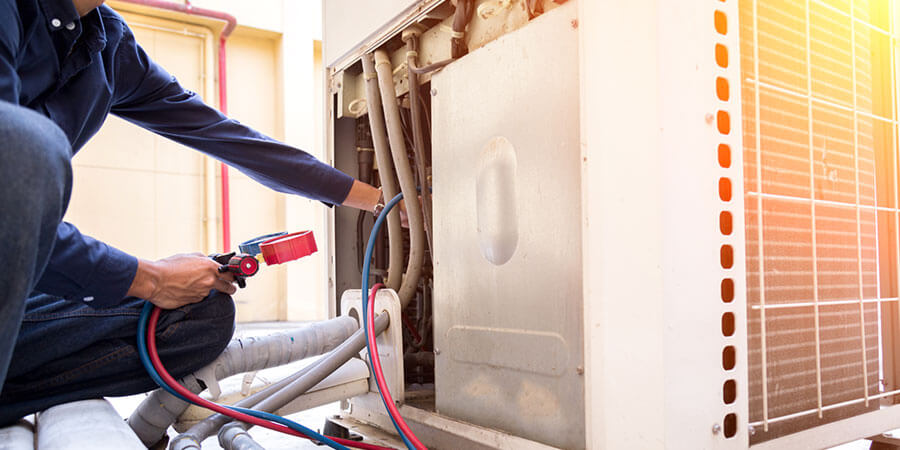Comprehensive HVAC Services by DMAKS HVAC Team.
Comprehensive HVAC Services by DMAKS HVAC Team.
Blog Article
Energy-Efficient HVAC Solutions to Reduce Energy Expenses
As power expenses continue to increase, the significance of energy-efficient a/c systems ends up being progressively obvious. These systems not only assure substantial cost savings on utility expenses yet also add to a more lasting future by minimizing energy intake. With various alternatives readily available, consisting of geothermal warm pumps and ductless mini-splits, homeowner deal with a wide range of choices that can boost convenience and air quality. Understanding the vital attributes and maintenance needs is necessary to optimizing these benefits. What variables should be prioritized when picking the ideal system for your needs?
Benefits of Energy-Efficient Cooling And Heating Systems
Energy-efficient Heating and cooling systems use countless advantages that extend beyond simple expense financial savings. By eating much less power, these systems contribute to lower greenhouse gas emissions, helping to combat climate change and promote sustainability.
Furthermore, energy-efficient a/c systems usually supply enhanced convenience levels. A number of these systems feature sophisticated innovation that enables for much better temperature level control and enhanced air high quality (DMAKS HVAC). This causes a much healthier interior atmosphere, which is especially essential for individuals with allergies or respiratory issues
Furthermore, spending in energy-efficient HVAC systems can boost residential or commercial property value. As even more customers prioritize energy efficiency, homes and structures outfitted with these systems might attract higher proposals in the genuine estate market.
Types of Energy-Efficient HVAC Options
Just how can homeowners and businesses select the most appropriate energy-efficient cooling and heating alternatives for their demands? The market offers a selection of energy-efficient a/c systems, each developed to boost convenience while reducing power usage.
One option is the variable cooling agent flow (VRF) system, which efficiently manages the temperature in numerous zones within a structure. This system adapts its cooling agent flow to match the wanted temperature, leading to considerable energy cost savings.
Another prominent choice is geothermal warmth pumps, which utilize the earth's secure temperature to warmth and amazing spaces. By transferring warmth to and from the ground, these systems demonstrate remarkable efficiency, specifically in moderate climates.
In addition, ductless mini-split systems offer an energy-efficient choice for homes lacking ductwork. These systems permit zone-specific heating & cooling, minimizing energy waste in vacant locations.
Last but not least, high-efficiency heating systems and a/c, with advanced SEER and AFUE ratings, use reliable climate control while taking in much less energy than conventional versions. By evaluating these options, house owners and organizations can select a cooling and heating system customized to their particular requirements and power performance objectives.
Trick Features to Consider

Following, check out the kind of compressor utilized in the system. DMAKS HVAC. Variable-speed compressors can adjust their outcome to match the home heating or cooling need, resulting in boosted comfort and power savings compared to single-speed versions. Additionally, seek systems geared up with clever thermostats that offer programmable setups and remote accessibility, enabling far better control over energy usage
An additional critical feature is the system's air filtration capability. High-efficiency filters can improve indoor air top quality and decrease power consumption by guaranteeing the system operates effectively. Moreover, take into consideration the sort of cooling agent made use of; modern-day systems usually use green cooling agents that have a reduced environmental impact.
Last but not least, make sure that the system is suitable with zoning technology, which permits personalized temperature level control in various locations of your home, boosting comfort while decreasing power usage.
Tips for Picking the Right System


Following, think about energy efficiency rankings, specifically the Seasonal Energy Efficiency Proportion (SEER) for cooling down systems and the Annual Gas Use Effectiveness (AFUE) for heater. Greater scores indicate greater efficiency, which can bring about considerable financial savings on energy expenses with time.
Additionally, review the kind of cooling and heating system that finest suits your hop over to these guys way of living and budget plan. Options consist of central air conditioning, ductless mini-splits, and heatpump, each with its own collection of advantages and downsides.
Don't overlook the value of proper setup and sizing; an incorrectly Click This Link sized system can bring about ineffectiveness and raised wear. Consult with an expert Heating and cooling specialist to obtain professional referrals tailored to your home's distinct needs. This comprehensive technique will certainly ensure that you choose an energy-efficient cooling and heating system that meets your needs and budget plan properly.
Maintenance for Optimal Effectiveness
As soon as the appropriate HVAC system is in location, continuous upkeep comes to be key to guaranteeing ideal performance and long life. A properly maintained system operates better, leading to reduced power usage and minimized energy costs. Normal examinations and tune-ups need to be scheduled at least twice a year-- once prior to the air conditioning period and as soon as prior to the home heating period.

Home owners ought to also be watchful about monitoring their HVAC system's efficiency. Uncommon sounds, fluctuating temperatures, or enhanced power costs can suggest underlying issues that need instant focus. By attending to these worries immediately, click site house owners can protect against expensive repair services and prolong the life expectancy of their systems.
Purchasing a maintenance plan with a certified service technician not only boosts efficiency but also supplies assurance, knowing that the system is running at its best. DMAKS HVAC. Regular maintenance is for that reason necessary for sustaining energy efficiency and lowering total functional expenses
Conclusion
Finally, energy-efficient cooling and heating systems present a feasible option for lowering energy costs while enhancing convenience and air quality. By including innovative modern technologies and options such as geothermal warmth pumps and ductless mini-splits, residential property owners can accomplish significant energy savings and add to ecological sustainability. Cautious consideration of system functions and ongoing maintenance further makes sure optimum performance, making energy-efficient systems a prudent financial investment for both economic and ecological benefits.
Report this page